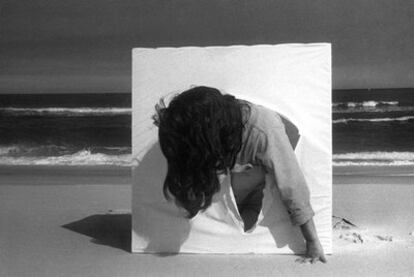The six queens of the Reina
Six women artists showing in the Reina Sofía contemporary art museum display a diversity of talents and concerns but also something in common
Spirited, mysterious, poetic, carnal, eccentric and earthly: the six women who invaded the rooms of the Reina Sofía contemporary art museum share common traits and a diversity of art.
The luminous neon stars and phallus shapes of Yayoi Kusama, the geometric and colorful definition of time employed by Lygia Pape and the black holes of Elena Asins all have common visions and fears. The suspended leather of Leonor Antunes, the wise nature of Lili Dojourie and the confused anthems of Maja Bajevic suggest agitated sensory connections that bring them closer to us and further away from time.
Their common obsession is to burst out of the frame, to surround the visitor with their art beyond the basic sense of sight by penetrating hearing, smell, taste and touch. "I hate the frame," says Asins, whom the museum is paying a big tribute to. Asins is very moved. "They've treated me better than my own father...literally," she says.
The women share an obsession with bursting out of the frame
Kusama's combative US performances landed her in jail in the 1960s
But besides this mystical Spanish artist who lives in retirement in Azpirotz, a village in Navarre, who is obsessed with seeing everything in black and white, the other stars of the day at the museum are the Japanese Kusama and the Brazilian Lygia Pape. The former bent conventions out of shape in the 1960s in the US with combative performances that landed her in jail. She later returned to Japan and voluntarily walked into a psychiatric hospital, where she returns to sleep every night after spending the day at her workshop.
The Kusama room greets visitors with giant red and white balls that leave shadows where they hypothetically bounce off the floor. The exhibition follows a chronological order. At first, in the 1950s, Yayoi Kusama began by exploring Surrealism through vaginas that resemble carnivore plants, and she later flirted with pop. "These are the two completely global avant-garde currents," said the director of the Madrid museum, Manuel Borja-Villel.
Later came the penises with sharp thorns, the slap of her abstract expressionism and finally the peace of her luminous cave, where the feeling of time and space is broken down into several dimensions and visitors placidly enter her world of invented stars. "They don't like this world," explains Borja-Villel. "That is why they create their own and ask you to step inside without any guarantees."
The mystery of the failure to adapt and feminine flight are also there in the world of Lygia Pape, who was able to weave extremely fine tubes of gold and silver that fly between the light and the shadows as moist vulvas appear in close-up on the mouth of a man for her short Eat me . In one piece, she makes poetry dance, in another she excites the lower instincts as a voice asks: "Gluttony or lust?"
She also trapped the days in The Book of Time , a work that takes up an entire wall where 365 different figures express a clear metaphor.
Asins invites visitors to share in her tricolor peace through the convulsed interior elements of her cardiograms. The subtle strokes seek "a perfect world," she says, even though this world may be black, like space. "It aims to sharpen the eyesight and see in the dark," says Asins. It's the voluntary female return to Plato's cave. According to the museum director, "women want to be inside, men want to get out."
Two other artists are showing their work outside the Reina Sofía, albeit in spaces that were set up by the museum. Bajevic's work Continuará (To be continued) is on display at the Palacio de Cristal in Retiro Park. The Belgian Lili Dujourie is exhibiting La naturaleza es sabia (Nature is wise) at Santo Domingo de Silos (Burgos).
All six artists form a radical, ambitious and fully modern sextet of contemporary art. They are truly the queens of the Reina Sofía.
Museo Reina Sofía. C/ Santa Isabel 52, Madrid. www.museoreinasofia.es

Tu suscripción se está usando en otro dispositivo
¿Quieres añadir otro usuario a tu suscripción?
Si continúas leyendo en este dispositivo, no se podrá leer en el otro.
FlechaTu suscripción se está usando en otro dispositivo y solo puedes acceder a EL PAÍS desde un dispositivo a la vez.
Si quieres compartir tu cuenta, cambia tu suscripción a la modalidad Premium, así podrás añadir otro usuario. Cada uno accederá con su propia cuenta de email, lo que os permitirá personalizar vuestra experiencia en EL PAÍS.
¿Tienes una suscripción de empresa? Accede aquí para contratar más cuentas.
En el caso de no saber quién está usando tu cuenta, te recomendamos cambiar tu contraseña aquí.
Si decides continuar compartiendo tu cuenta, este mensaje se mostrará en tu dispositivo y en el de la otra persona que está usando tu cuenta de forma indefinida, afectando a tu experiencia de lectura. Puedes consultar aquí los términos y condiciones de la suscripción digital.








































